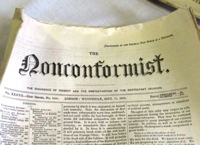Nonconformist
Definitions
- 1often capitalized : a person who does not conform to an established church; especially : one who does not conform to the Church of England
- 2: a person who does not conform to a generally accepted pattern of thought or action.
Description
Nonconformity (usually capitalized) is the refusal to "conform" to, or follow, the governance and usages of the Church of England by the Protestant Christians of England and Wales.
Origins and use
In England, after the Act of Uniformity 1662 a Nonconformist was an English subject belonging to a non-Christian religion or any non-Anglican church. A person who also advocated religious liberty may also be more narrowly considered as such. English Dissenters (such as Puritans and Presbyterians) who violated the Act of Uniformity 1559 may retrospectively be considered Nonconformists, typically by practising or advocating radical, sometimes separatist, dissent with respect to the Established Church.
Presbyterians, Congregationalists, Baptists, Quakers (founded in 1648), and those less organized were considered Nonconformists at the time of the 1662 Act of Uniformity. Later, as other groups formed, they were also considered Nonconformists. These included Methodists, Unitarians, and members of the Salvation Army.
The religious census of 1851 revealed that total Nonconformist attendance was very close to that of Anglicans.
